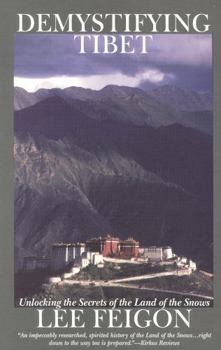Demystifying Tibet: Unlocking the Secrets of the Land of the Snows
Select Format
Select Condition 
Book Overview
The author of China Rising here describes Tibet's long and independent history, focusing on its politics and culture, and shows how its future now lies largely in China's hands. "An impeccably researched, spirited history of the forces that shaped today's Tibet, right down to the way tea is prepared." -Kirkus Reviews.
Format:Paperback
Language:English
ISBN:1566631963
ISBN13:9781566631969
Release Date:April 1998
Publisher:Ivan R. Dee Publisher
Length:256 Pages
Weight:0.84 lbs.
Dimensions:0.8" x 5.7" x 8.7"
Customer Reviews
4 ratings
Begin here
Published by Thriftbooks.com User , 21 years ago
The title of this book is apt, for it serves as a handy quick introduction to the vast sweep of Tibetan history, disclosing a land that is not simply the mystical shangri-la we often imagine it is. Like many western readers, I knew next to nothing of the history of Tibet and central asia before the Chinese takeover. The first few chapters here do a good job of outlining this subject, all the while leading up to the author's central thesis that Tibet has historically been separate from China, both politically and culturally. However, political history is seldom cut and dried, and as we move towards the twentieth century we see how British, Russian, and Chinese imperialist politics combined with divisions and corruptions inside Tibet to seal the fate of this isolated country. It was eye-opening to see Tibet as not merely a hapless victim of a cruel invasion, but also as an active, humanly flawed player in the region's mutable history. The author is a college professor but his writing is easily accessible to a general audience.
Couldn't put it down!
Published by Thriftbooks.com User , 21 years ago
I thought this book would be really dry and hard to read. It was as gripping as a lot of novels. I liked it because it didn't talk down to the reader, but explained things clearly enough for those of us unfamiliar with Tibet. Since I have degrees in International relations and Political Science, I can say that it is a balanced account. Things weren't perfect before the Chinese arrived and they have made some improvements. The problem is what is being done to Tibetian culture by China. My Chinese friends tell me how they 'civilized' Tibet but that argument rang hollow to me. I liked how all aspects of Tibet are discussed, the climate, cuisine, culture, etc. along with the history and politics. It's inspired me to learn more about this facinating area of the world.
An excellent general introduction to Tibet!
Published by Thriftbooks.com User , 23 years ago
Lee Feigon's 'Demystifying Tibet: Unlocking the Secrets of the Land of the Snows' is an excellent source book that provides interesting information about Tibetan history, geography, culture, and religion. This is a 'must-read' book for anyone interested in Tibet, or have plans to visit this fascinating country. The author adopts a very 'reader friendly' style, which does not over simplify or compromise his writing. This is probably one of the best general introduction books on Tibet that I have read.
Helpful, balanced account of Tibetan history, culture
Published by Thriftbooks.com User , 24 years ago
I bought this book prior to making a trip to Tibet in 1999, and found it to be invaluable in helping me to understand the history and culture of the amazing place I was to visit. Feigon takes the reader through Tibet's long history, from the time of conquering Tibetan kings to the present. But rather than delivering a dry historical narrative, the author weaves in much about Tibetan culture, such as the role of women in society and the importance of religion to people's lives. As I toured Tibet and listened to the "Chinese version" of Tibetan history, it was helpful to have read this book in order to better understand the complex reality of Tibet's historical experiences. Feignon strives for balance, and shows that while Tibet is clearly not "an inalienable part of China", neither is it the Shangri-la of Hollywood movie stars or teen rock idols. He criticizes the Western image of Tibetans as innocent victims, painting a bigger picture of Tibet's complex--and not always pleasant--history. But despite this effort to achieve balance, the author's animosity toward China comes through loud and clear. While many of his criticisms seem justified, his bias causes him to gloss over some aspects of Tibet's history. The Chinese, for example, make much of having "liberated" Tibetans from serfdom, and indeed, it would have been useful to know more about what really happened. Yet Feigon devotes only one paragraph to describing the feudal system which dominated most people's lives in Tibet prior to 1950. Nevertheless, reading this book helps one to understand that the future of Tibet cannot simply be a return to the theocratic system of the early 20th century. Mr. Feigon's book does much to de-bunk the simplistic myths that have grown up around Tibet, propagated (mainly) by China but also by those who claim Tibet's cause as their own.




